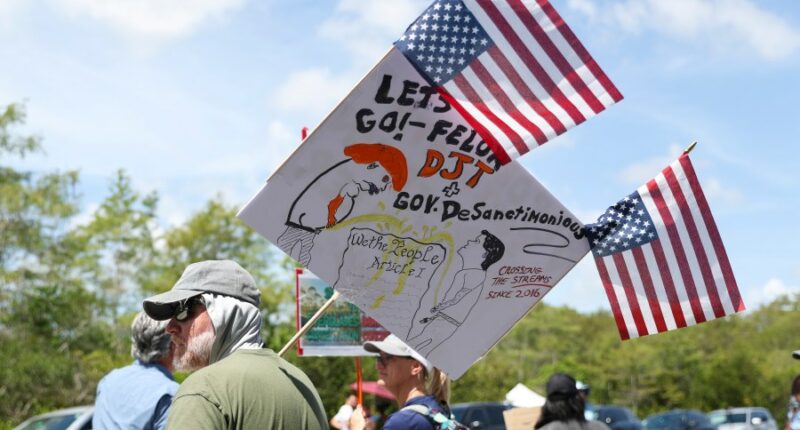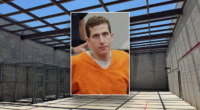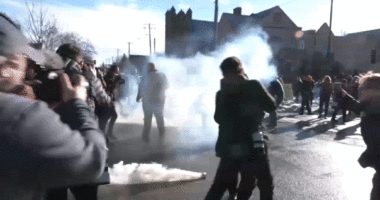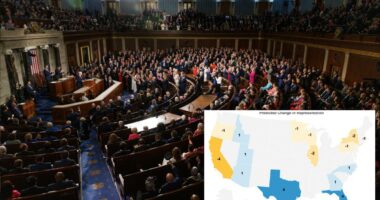Share this @internewscast.com

MIAMI (AP) — The construction of a temporary immigration detention center in the Florida Everglades, known as “Alligator Alcatraz,” might be paused indefinitely as a federal judge deliberated on Wednesday if developing on delicate wetlands breached environmental regulations.
Last week, U.S. District Judge Kathleen Williams implemented a 14-day pause on additional construction at the location while witnesses provide testimony. The temporary order does not impose any limitations on law enforcement or immigration enforcement activities.
The initial phase of “Alligator Alcatraz” launched in July on the site of a lightly used, single-runway training airport. As of last week, it housed fewer than 1,000 detainees, and it is equipped to eventually accommodate up to 3,000 individuals.
President Donald Trump visited the facility last month, proposing it could serve as a prototype for future detention centers across the nation as his administration hurries to bolster infrastructure for increasing deportations.
Inside the large white tents of the compound, rows of bunk beds are enclosed by chain-link fences. Detainees report finding worms in their food, non-functioning toilets that overflow with waste, and constant pests like mosquitoes and other insects. Occasionally, the air conditioning cuts out in the oppressive heat. It is said that detainees sometimes go for days without showers or necessary medications, and they can only communicate with attorneys and family via phone.
Governor Ron DeSantis has mentioned that the site’s location in the rugged and isolated Everglades served as an escape deterrent, mirroring the concept of the island prison in California that inspired the name. The detention center has an estimated annual operating cost of $450 million, according to a public database.
Attorneys for the state and federal government say that although the detention center would hold federal detainees, its construction and operation is entirely under the state of Florida, meaning a federal environmental review wouldn’t apply.
However, the lawsuit by environmental groups and the Miccosukee Tribe says it makes no difference that Florida built the facility, since federal agencies have authority over immigration.
Williams last week said the detention facility was, at a minimum, a joint partnership between the state and federal government.
Plaintiffs presented witnesses Wednesday and Thursday who testified that the facility violates the National Environmental Policy Act, which requires federal agencies to assess the environmental effects of major construction projects.
The lawsuit asks the judge to issue a preliminary injunction to halt operations and further construction, which the plaintiffs say threatens environmentally sensitive wetlands that are home to protected plants and animals and would reverse billions of dollars’ worth of environmental restoration.
Witnesses for the environmental groups have testified that at least 20 acres (8 hectares) of asphalt have been added to the site since the Florida Division of Emergency Management began construction. They said additional paving could lead to an increase in water runoff to the adjacent wetlands, spread harmful chemicals into the Everglades and reduce the habitat for endangered Florida panthers.
Marcel Bozas, director of the Miccosukee Tribe’s fish and wildlife department, said tribe members hunt and fish for subsistence and cultural reasons.
David Kerner, the head of the state’s Department of Highway Safety and Motor Vehicles, testified that “Alligator Alcatraz” is a state-run facility and said Washington doesn’t tell Florida where to detain immigrants. He said the detention center was needed to alleviate overcrowding at other lockups.
Kerner couldn’t say whether any other sites besides the Everglades were considered for possible detention centers, or how many detainees there have been charged with violent crimes.
The lawsuit was being heard as DeSantis′ administration was apparently preparing to build a second immigration detention center at a Florida National Guard training center in north Florida.
A second lawsuit claims detainees’ constitutional rights are being violated because they are barred from meeting lawyers, are being held without any charges, and a federal immigration court has canceled bond hearings. Over the weekend, a federal judge gave the state until late September to prepare arguments against an effort to get the civil rights litigation certified as a class action.

















